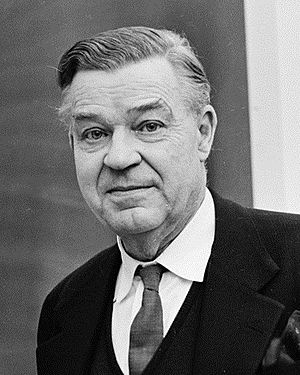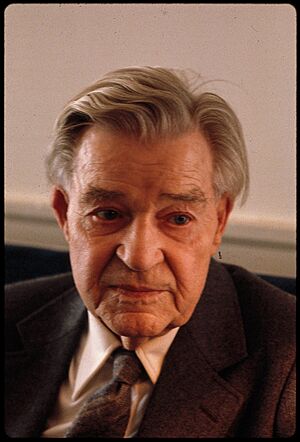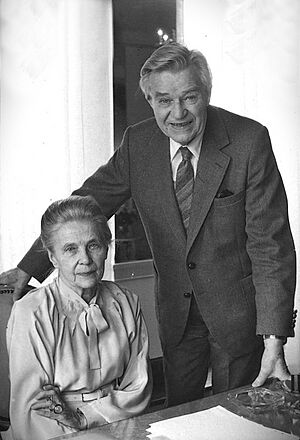Gunnar Myrdal facts for kids
Quick facts for kids
Gunnar Myrdal
|
|
|---|---|

Myrdal in 1964
|
|
| Born |
Karl Gunnar Myrdal
6 December 1898 Skattungbyn, Sweden
|
| Died | 17 May 1987 (aged 88) Trångsund, Sweden
|
| Spouse(s) | |
| Institution | Stockholm University NYU |
| Field | Macroeconomics, sociology |
| School or tradition |
Stockholm school |
| Alma mater | Stockholm University |
| Doctoral advisor |
Gustav Cassel |
| Doctoral students |
|
| Influences | Knut Wicksell John R. Commons Raúl Prebisch |
| Contributions | Monetary equilibrium, ex-ante, circular cumulative causation |
| Awards | Nobel Memorial Prize in Economic Sciences (1974) Bronislaw Malinowski Award (1975) |
Karl Gunnar Myrdal (born December 6, 1898 – died May 17, 1987) was a Swedish economist and sociologist. He studied how money works and how economies change. He also looked at how economic, social, and other factors are connected.
In 1974, he won the Nobel Memorial Prize in Economic Sciences. He shared it with Friedrich Hayek. Later, his wife, Alva Myrdal, won the Nobel Peace Prize in 1982. They were the first married couple to win Nobel Prizes independently.
In the United States, Myrdal is famous for his study on race relations. This led to his important book, An American Dilemma: The Negro Problem and Modern Democracy. This study helped influence the 1954 U.S. Supreme Court decision Brown v. Board of Education. This decision made racial segregation in public schools illegal. In Sweden, his work helped create the idea of the "Folkhemmet" (the People's Home) and the welfare state. This means the government helps make sure everyone has a good standard of living.
Contents
Early Life and Education
Gunnar Myrdal was born on December 6, 1898, in Skattungbyn, Sweden. His father was a building contractor. Gunnar took the name Myrdal in 1914, named after his family's farm.
He earned a law degree from Stockholm University in 1923. He then got his doctorate (PhD) in economics in 1927. In 1924, he married Alva Reimer. They had three children.
Myrdal's PhD paper was called The Problem of Price Formation under Economic Change. In it, he looked at how people's expectations affect prices. His ideas were very important for the Stockholm school of economics. He built on the ideas of Knut Wicksell. Myrdal emphasized how expectations (what people think will happen) play a big role in the economy.
Early Career and Ideas
From 1925 to 1929, Myrdal studied in Britain and Germany. He also visited the United States. During this time, he wrote his first books. One important book was The Political Element in the Development of Economic Theory (1930).
In The Political Element, Myrdal argued that economics should be a true science. He believed it should be objective and separate from politics. He felt that many economists mixed facts with their own political views. He wanted economics to be based on clear, unbiased facts.
Myrdal was interested in mathematical models in economics at first. He even helped start the Econometric Society. But later, he criticized these models. He felt they focused too much on economic growth and ignored how wealth was shared. He also thought they sometimes used bad statistics. He famously said, "Correlations are not explanations."
Myrdal also developed the idea of circular cumulative causation. This means that different factors in society and the economy affect each other in a cycle. For example, poverty can lead to poor education, which then leads to more poverty.
Academic and Political Work
Gunnar Myrdal became a professor of economics at Stockholms Högskola (now Stockholm University) in 1933. He taught there for 15 years.
He also became a politician. He was a member of the Social Democratic party in the Swedish Parliament from 1933. Later, from 1945 to 1947, he served as the Minister of Commerce and Industry.
With his wife, Alva Myrdal, he wrote Crisis in the Population Question in 1934. This book helped inspire policies in Sweden to support families.
In 1938, Myrdal began a big study on race relations in the United States. This study was funded by the Carnegie Corporation. The result was his most famous book, An American Dilemma: The Negro Problem and Modern Democracy, published in 1944. He described the "American Dilemma" as the conflict between America's ideals of freedom and equality, and the reality of how African Americans were treated. This book was used by the U.S. Supreme Court in its 1954 decision to end racial segregation in public schools.
World War II and Beyond
During World War II, Gunnar Myrdal was strongly against the Nazis. He and his wife wrote Contact with America in 1941, praising American democracy.
In 1947, Myrdal became the Executive Secretary of the United Nations Economic Commission for Europe. He helped create an important center for economic research there. After ten years, he left this role in 1957. He then published books like An International Economy, Problems and Prospects and Rich Lands and Poor.
Myrdal also signed the 1950 UNESCO statement The Race Question. This statement argued against ideas of racial superiority.
Between 1960 and 1967, he was a professor of international economics at Stockholm University. He also founded the Institute for International Economic Studies there. In the 1960s, he worked on a large study of South Asia. This led to his three-volume book, Asian Drama: An Inquiry into the Poverty of Nations (1968). In 1970, he wrote The Challenge of World Poverty, suggesting ways to solve the problems in Asia.
Gunnar Myrdal was strongly against the Vietnam War. He urged the United States to negotiate with North Vietnam. He also led the Swedish Vietnam Committee. He was a signer of the Humanist Manifesto.
In 1974, he shared the Nobel Memorial Prize in Economic Sciences with Friedrich Hayek. However, Myrdal later argued that this prize should be stopped. He believed economics was a "soft" science, meaning it's not as exact as natural sciences.
Personal Life
Gunnar Myrdal married Alva Myrdal in 1924. She was a politician and diplomat. They had three children: son Jan Myrdal (born 1927), daughter Sissela Bok (born 1934), and daughter Kaj Fölster (born 1936). Their grandson is the Swedish economist Stefan Fölster.
Alva Myrdal was a key leader in the movement to reduce weapons worldwide. She won the Nobel Peace Prize in 1982.
Gunnar Myrdal had Parkinson's disease. He passed away on May 17, 1987, in Trångsund, Sweden.
Ideas on Society and Economics
Gunnar Myrdal's ideas went beyond just economics. He believed that social science, political science, and economics were all connected. He thought that researchers should be clear about their own values when studying society.
Myrdal is seen as a founder of social policy. He helped shape ideas about the welfare state around the world. He wrote books like Beyond the Welfare State (1958). His idea of "circular cumulative causation" also helped develop modern economic theories.
From Welfare State to Welfare World
Myrdal suggested that we should move from a "welfare state" to a "welfare world." A welfare state helps its own citizens. A welfare world would mean sharing wealth and resources not just within a country, but across the globe. He thought this would be much harder to achieve.
He pointed out some challenges for a "welfare world":
- Rich Western countries often focused only on their own people.
- Developing countries faced many difficulties in growing.
- The existence of communist countries created political tensions.
Awards and Honours
Awards
- West German Peace Prize (1970; with his wife Alva Myrdal)
- Nobel Memorial Prize in Economic Sciences (1974)
- Bronislaw Malinowski Award (1975)
Honorary Degrees
Gunnar Myrdal received many honorary degrees from universities around the world, including:
- Harvard University (1938)
- Columbia University (1954)
- Yale University (1959)
- University of Edinburgh (1964)
- Stockholm University (1966)
- Heriot-Watt University (1979)
Honours
- Fellow of the Econometric Society (1943)
- Member of the Royal Swedish Academy of Sciences (1945)
- Honorary member of the American Economic Association (1947)
- Member of the American Academy of Arts and Sciences (1958)
- Member of the British Academy (1973)
- Member of the American Philosophical Society (1982)
See also
 In Spanish: Gunnar Myrdal para niños
In Spanish: Gunnar Myrdal para niños



